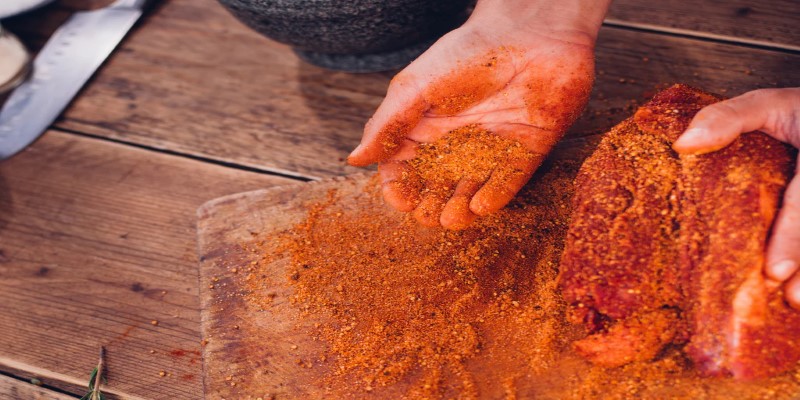Ever wondered why restaurant food often tastes better than what you cook at home? The secret isn’t just in fancy techniques—it’s all about seasoning. The right balance of salt, acid, heat, and herbs can turn a simple dish into a masterpiece.
But how do you get it right every time? How do you make sure your food bursts with flavor without being too salty, bland, or overpowering? Let’s break it down step by step.
The Role of Seasoning
Seasoning isn't just about salt and pepper. It's a combination of ingredients that enhance the natural flavors of food. A perfectly seasoned dish shouldn't taste like a mix of spices—it should taste like itself but better.
Here’s what you need to know about the main components of seasoning:
Salt
The backbone of seasoning. It doesn’t just make food salty—it enhances other flavors by drawing out moisture and balancing sweetness.
Acid
Think vinegar, citrus, or fermented ingredients. A touch of acidity brightens up a dish and prevents it from tasting flat.
Heat
Spices like chili flakes, black pepper, or cayenne add depth and warmth.
Umami
This savory element comes from ingredients like soy sauce, Parmesan, mushrooms, or miso. It creates a deep, rich flavor.
Sweetness
Sometimes, a hint of sugar, honey, or fruit balances out acidity or spice. It can round out a dish without making it "sweet."
Bitterness
Ingredients like coffee, cocoa, or dark leafy greens add complexity and contrast.
The Golden Rules of Seasoning
Salt in Layers, Not All at Once
Adding salt gradually allows it to penetrate ingredients properly. Season meats before cooking, taste while cooking, and adjust at the end. This prevents over-salting and ensures even distribution.
Acid Balances Salt
If a dish feels too salty, add a splash of lemon juice or vinegar. This counteracts the saltiness and brings freshness to the flavors.
Taste As You Go
Professional chefs don’t just follow recipes blindly—they constantly taste and adjust. Every ingredient you add changes the balance, so keep sampling and tweaking.
Use Fresh Herbs at the Right Time
Fresh herbs like basil, cilantro, or parsley should be added at the end of cooking for maximum flavor. Dried herbs like oregano and thyme work best when they have time to simmer and release their oils.
Spices Need Heat to Bloom
Have you ever wondered why Indian or Mexican food has such deep flavors? They toast their spices in oil before adding other ingredients. This releases essential oils and intensifies their taste.
Sugar Can Save a Dish
If your food tastes too tangy or bitter, a little sugar can fix it. This is why tomato sauces often include a pinch of sugar—to balance the acidity.
Mastering Seasoning in Different Dishes
Each type of cuisine and dish requires a different approach to seasoning. Let’s break down some common categories:
Meat and Poultry
• Always season meat in advance, ideally an hour before cooking. This helps the salt penetrate for a deeper flavor.
• For richer meats like beef or lamb, use bold seasonings like garlic, rosemary, or smoked paprika.
• Chicken and fish benefit from citrus and lighter herbs like thyme and dill.
• Dry rubs work best for grilling. A marinade with acid (like lemon juice or vinegar) keeps meat tender for roasting.

Vegetables
• Roasted vegetables taste best with olive oil, salt, and a pinch of spice, such as cumin or smoked paprika.
• Steamed veggies need an acidic lift—try lemon zest or a splash of balsamic vinegar.
• Fresh herbs at the end make all the difference in salads and sautéed greens.
Soups and Stews
• Salt early, but adjust throughout cooking as flavors develop.
• A touch of vinegar or lemon at the end brightens the whole dish.
• Layered flavors from slow-simmered spices make soups taste deeper.
• Use a combination of fresh and dried herbs—dried for slow cooking and fresh for finishing.
Pasta and Grains
• Always salt pasta water—it should taste like the sea. This ensures your pasta has flavor before adding sauce.
• Season grains like rice or quinoa with broth instead of water for extra depth.
• Don’t forget a finishing touch: Parmesan, fresh herbs, or olive oil can elevate a simple pasta dish.
Sauces and Dressings
• The key to a good dressing is balance—oil, acid, and seasoning should work together.
• Mustard, garlic, and honey can add complexity without overpowering.
• For sauces, a little reserved pasta water can help emulsify and enhance the texture.
Common Mistakes and How to Fix Them
Even experienced cooks mess up seasoning sometimes. Here’s how to fix common issues:
Too Salty?
Add acid (lemon juice, vinegar) or a starchy ingredient like potatoes to absorb excess salt.
Too Spicy?
Dairy (yogurt, cream) or a little honey can cool it down.
Too Bland?
Try adding a pinch of salt, a splash of acid, or a sprinkle of fresh herbs.
Too Bitter?
A bit of sugar or fat (butter, cream) can mellow bitterness.
Too Sweet?
A squeeze of lemon juice or a pinch of salt can counteract excess sweetness.
Experimenting With Seasoning: Becoming a Flavor Master

Seasoning isn’t just about following rules—it’s about experimenting. The best way to develop your seasoning skills is to try different combinations and notice what works best.
Here are some fun ways to practice:
Blind Taste Tests
Try a spoonful of soup before and after adding acid or spice. Notice the difference?
Play With Contrasts
Pair something salty with something sweet or something bitter with something creamy.
Keep a Flavor Journal
Write down what you used and how it turned out. Over time, you’ll build an instinct for what works.
Try Global Flavors
Explore spice blends like garam masala, za’atar, or Cajun seasoning. Each culture has its own way of balancing flavors.
The more you experiment, the better you'll instinctively know what a dish needs.
Elevating Your Cooking with Seasoning
Mastering seasoning isn’t about memorizing complex techniques—it’s about understanding balance. When you get it right, even the simplest dish can taste like something from a five-star restaurant.
So, the next time you cook, take a moment to taste, adjust, and experiment. Before you know it, you'll be seasoning like a pro, creating dishes that don't just taste good but taste unforgettable. Now, grab those spices and start cooking!